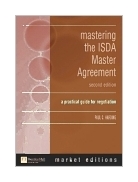|
||
• wydawnictwa polskie
• Zamów informacje o nowościach z wybranego tematu • kontakt
• Cookies na stronie |
MASTERING THE ISDA MASTER AGREEMENTS 1992-2002HARDING P.wydawnictwo: FT/PH , rok wydania 2004, wydanie IIcena netto: Mastering the ISDA Master Agreement 1992 and 2002, will provide a practical, clear and useful foundation for the fledgling negotiator as well as supporting them with a good overview of the legal, credit and operational issues inherent in the ISDA Master Agreement. Mastering the ISDA Master Agreement 1992 and 2002 is designed to build on the success of the first edition by extending coverage of to the new 2002 ISDA Master Agreement, and extends the coverage of the first edition. Once again this book will provide the many new entrants globally to derivatives documentation with a practical negotiation guide to both the 1992 and 2002 Agreements so they can be approached confidently. Paul Harding has worked in several UK and foreign banks in London in credit, marketing and documentation roles. Since 1990 he has been involved with derivatives documentation, and was a well-known negotiator in the City with Barclays Capital Securities and Hill Samuel Bank, where he was head of treasury documentation. In 1997 he founded Derivatives Documentation Ltd, a derivatives consultancy and project management company based in the City of London and providing negotiation, recruitment and in-house training services in derivatives documentation. Its clients include many of the world's leading banks. Paul Harding brings over ten years' in-depth market experience to the subject of this book. Contents Chapter 1. Introduction to the global derivatives market -Size of market according to latest ISDA figures. -Estimated amount really at risk. -Main products -Main currencies. -Market users. -How a deal is done from start to finish. Chapter 2. Need for and evolution of the ISDA Master Agreement -Inefficiency in documenting each trade in the market's early days. -Documentation standardisation introduced by ISDA from 1985. -How ISDA documentation evolved. -Product Definitions -Confirmations -Master Agreement types. Chapter 3. Section by section clear analysis of the 1992 ISDA Master Agreement The idea is as before to have a block of ISDA Master Agreement text on one page and a clear explanation of it on the opposite page. Written approval has been given by ISDA to reproduce the 1992 ISDA Master Agreement in this format. Chapter 4. Section by section clear analysis of the 2002 ISDA Master Agreement Same format. Written approval has been given by ISDA to reproduce the 2002 ISDA Master Agreement in this format. Chapter 5. Legal issues relating to the ISDA Master Agreements UK issues -Gaming laws -Capacity and authority of transacting parties. -Ultra vires considerations. -the Hammersmith and Fulham case and local authorities as swaps counterparties. -Protection from case law and the 1985 Companies Act in the UK. -specialised entities e.g. insurance companies, pension funds, unit trusts, building societies. -The concept of suitability. -Enforceability of close-out netting and set-off. -Automatic Early Termination. -The ISDA collective legal opinions. -Third Party Rights. New section on US issues Chapter 6. Credit issues relating to the ISDA Master Agreements -Addition of Specified Entities. -Specified Indebtedness variations. -Downgrade from Cross Default to cross acceleration. -Threshold Amounts. -Credit Event Upon Merger variations. -Additional Termination Events. -Set Off -Transfers. -Political risk. -The "vanilla ISDA". Chapter 7. Operational issues relating to the ISDA Master Agreements -Confirmations -Payments -Deliveries -Close out -Administrative matters. Chapter 8. A sample 1992 ISDA Master Agreement Schedule and accompanying commentary Chapter 9. A sample 2002 ISDA Master Agreement Schedule and accompanying commentary In each of these chapters the idea is to have a block of Schedule text on one page and a clear explanation of it on the opposite page. Chapter 10. Provisions for special entity types and those sought by US counterparties As per the first edition with some updating Chapters 8, 9 and 10 are the hub of the book because the Schedule is what negotiators actually negotiate and where they need core knowledge and awareness of possible variations and their implications. Chapter 11. New developments Annexes 745 pages Księgarnia nie działa. Nie odpowiadamy na pytania i nie realizujemy zamówien. Do odwolania !. |


